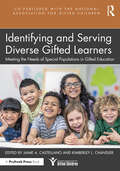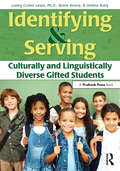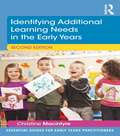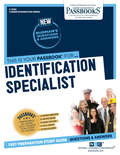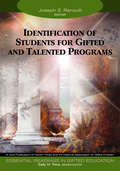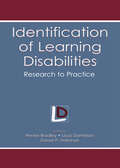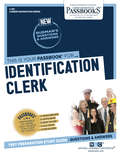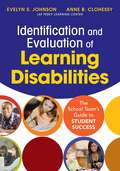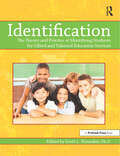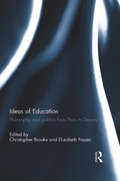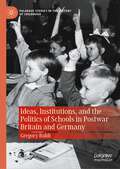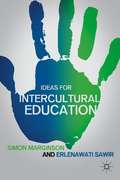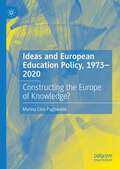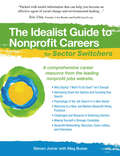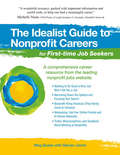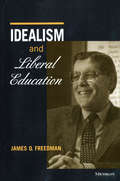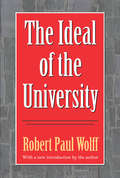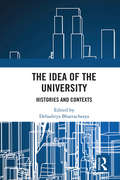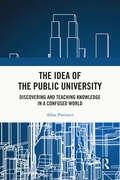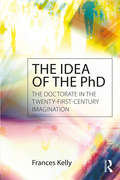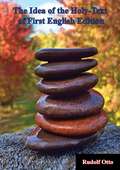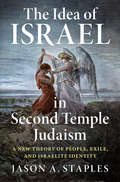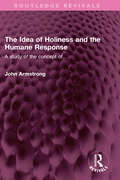- Table View
- List View
Identifying and Serving Diverse Gifted Learners: Meeting the Needs of Special Populations in Gifted Education
by Jaime A. CastellanoGrounded in a combination of evidence, personal narratives, interviews, data, and research, Identifying and Serving Diverse Gifted Learners: Meeting the Needs of Special Populations in Gifted Education is a guiding resource for all stakeholder groups in gifted education to shift the equity needle of gifted programs in America. Though it is the right of Black, Hispanic/Latinx, twice-exceptional (2e), low-income, and other special populations of students to have access to advanced academic programs in the American educational system, complex and deep-rooted systemic issues often block the way. This seminal text thoughtfully brings the conversation around historically underrepresented students in gifted education to the forefront, drawing on real-world examples to provide an accessible discussion of foundational, interdependent topics, including current research and promising educational practices. Readers will develop a basic theoretical understanding of the issues and be able to advance more responsive programs and experiences for low-income, racially, culturally, and linguistically diverse gifted students, and other diverse gifted populations. This text serves as a beacon to motivate K-12 educators, researchers, and scholars to carry the torch of advocacy on behalf of those students historically underrepresented in programs for the gifted and talented.
Identifying and Serving Culturally and Linguistically Diverse Gifted Students
by Lesley Collier Lewis Annie Rivera Debbie RobyIdentifying and Serving Culturally and Linguistically Diverse Gifted Students revolutionizes the identification and education of culturally and linguistically diverse (CLD) gifted and talented students. Written with the educator, administrator, and program developer in mind, this book will positively transform the educational system for working with CLD student populations. Correlated with the updated NAGC standards, the book examines existing program structures through the lens of over- and underrepresentation of CLD students in gifted programs. The book also features a formula for auditing current programs for CLD representation and an innovative model for identifying these students for gifted services.
Identifying and Nurturing Math Talent
by M. Katherine GavinNow more than ever, we must cultivate top-notch mathematicians in order to address the needs, issues, and problems of the 21st century. Identifying and Nurturing Math Talent provides information for teachers, administrators, and parents interested in identifying and supporting mathematical talent in children and adolescents. This book offers practical advice on identifying mathematical talent, developing rigorous mathematics curricula, preparing highly qualified teachers, and locating specialized programs and schools in order to support the learning requirements of mathematically talented students.
Identifying Additional Learning Needs in the Early Years: Listening To The Children (Essential Guides for Early Years Practitioners)
by Christine MacintyreI know there is something wrong, but what? How do I know if outside help for this child is needed? How do I tell parents that their child could have a learning difficulty? These are questions that most nursery workers will have to face during their careers, and questions which this new edition of Identifying Additional Learning Needs sets out to answer. Based on the experiences of real children and typical situations in early years settings, this book will be an invaluable companion for early years practitioners who care for and educate young children with additional learning needs. Attention Deficit Disorder, dyspraxia, dyslexia and autism are some of the difficulties explained in depth, with detailed suggestions to help support children with these special needs. Chapters in this fully revised new edition: explore the process of early identification; show how to make inclusion a reality in the nursery; tackle the complex issue of dealing with parents; discuss techniques for skilled and informed observation and assessment. Include developmental charts to allow a child’s progress to be monitored and celebrated. Each chapter has an explanation section supported by a set of practical strategies to support both the child and the practitioner. Throughout this lively and informative book, Christine Macintyre uses case studies to highlight the importance of listening to young children and shows how making time for listening is vital to providing exactly the right level of help and support.
Identification Specialist: Passbooks Study Guide (Career Examination Series)
by National Learning CorporationThe Identification Specialist Passbook® prepares you for your test by allowing you to take practice exams in the subjects you need to study. It provides hundreds of questions and answers in the areas that will likely be covered on your upcoming exam, including but not limited to: knowledge of the American Fingerprint Classification System; knowledge of identification operations and the identification services; interpreting written directions; understanding and interpreting written material; supervision; and more.
Identification of Students for Gifted and Talented Programs
by Joseph S. Renzulli Sally M. ReisFocuses on one of the most widely debated topics in the field, addressing the challenges educators face in attempting to accurately identify gifted and talented students.
Identification of Learning Disabilities: Research To Practice (The LEA Series on Special Education and Disability)
by Renée Bradley Louis Danielson Daniel P. HallahanIdentification of Learning Disabilities: Research to Practice is the remarkable product of a learning disabilities summit conference convened by the Office of Special Education Programs (OSEP) in August 2001 and the activities following that summit. Both the conference and this book were seen as important preludes to congressional reauthorization of the historic Individuals With Disabilities Education Act (IDEA) scheduled for 2002 and subsequent decision making surrounding implementation. The OSEP conference brought together people with different perspectives on LD (parents, researchers, practitioners, and policymakers) and resulted in this book, which examines the research on nine key issues concerning the identification of children with learning disabilities. Coverage includes alternative responses to treatment, classification approaches, processing deficit models, and approaches to decision making. Chapter Structure-- Each of the first nine chapters is organized around a lengthy, issue-oriented paper, which presents the most current research on that topic. These primary papers are then followed by four respondent papers that reflect a variety of viewpoints on the topic. Summarizing Chapter -- A small group of researchers (listed in the final chapter) dedicated an enormous amount of time to summarizing the research and developing key consensus statements regarding the identification of children with learning disabilities. Their work is sure to have a tremendous impact on future discussions in this area. Expertise-- The following well-known scholars have helped summarize the vast amount of research presented in this book as well as the consensus statements derived therefrom: Lynne Cook, Don Deshler, Doug Fuchs, Jack M. Fletcher, Frank Gresham, Dan Hallahan, Joseph Jenkins, Kenneth Kavale, Barbara Keogh, Margo Mastopieri, Cecil Mercer, Dan Reschley, Rune Simeonsson, Joe Torgesen, Sharon Vaughn, and Barbara Wise.
Identification Clerk: Passbooks Study Guide (Career Examination Series)
by National Learning CorporationThe Identification Clerk Passbook® prepares you for your test by allowing you to take practice exams in the subjects you need to study. It provides hundreds of questions and answers in the areas that will likely be covered on your upcoming exam, including but not limited to: basic fingerprint knowledge; understanding and interpreting written material; clerical abilities; name and number checking; coding; abstract reasoning; and more.
Identification and Evaluation of Learning Disabilities: The School Team’s Guide to Student Success
by Evelyn S. Johnson Anne B. ClohessyEnsure that your students have the support they need! When it comes to designing instruction for students with learning disabilities, one size does not fit all — and that’s also true for identifying and evaluating learning disabilities. Theories and legislation aside, it’s critical for your school team to have a comprehensive plan to make sure every child gets the right kind of attention—and no one falls through the cracks. This compelling, easy-to-use handbook guides general educators, special educators, administrators, and school psychologists through the eligibility and evaluation stages to ensure that students get the best services and interventions they need to be successful. You’ll find: Guidance on what data to collect and how to collect it Strategies for combining RTI with a comprehensive evaluation to diagnose SLD Detailed case studies—with graphs, figures, and test scores—at the school, classroom, and individual student level Everyone on your team has the same goal: to help students with learning challenges achieve success. This comprehensive resource has the tools you need to make that happen. "This book reminds educators that we are responsible for all of our students. When students are not making the progress we expect, this text offers very specific, practical suggestions that educators can follow. This book helps to identify if a student has a specific learning disability and offers suggestions for addressing the student’s difficulty through a team approach. When using the case studies, teachers will see many examples related to their own students and find new resources to try in their classrooms that will assist those who are having difficulty making significant progress." —Marcia B. Imbeau, Professor University of Arkansas
Identification and Evaluation of Learning Disabilities: The School Team’s Guide to Student Success
by Evelyn S. Johnson Anne B. ClohessyEnsure that your students have the support they need! When it comes to designing instruction for students with learning disabilities, one size does not fit all — and that’s also true for identifying and evaluating learning disabilities. Theories and legislation aside, it’s critical for your school team to have a comprehensive plan to make sure every child gets the right kind of attention—and no one falls through the cracks. This compelling, easy-to-use handbook guides general educators, special educators, administrators, and school psychologists through the eligibility and evaluation stages to ensure that students get the best services and interventions they need to be successful. You’ll find: Guidance on what data to collect and how to collect it Strategies for combining RTI with a comprehensive evaluation to diagnose SLD Detailed case studies—with graphs, figures, and test scores—at the school, classroom, and individual student level Everyone on your team has the same goal: to help students with learning challenges achieve success. This comprehensive resource has the tools you need to make that happen. "This book reminds educators that we are responsible for all of our students. When students are not making the progress we expect, this text offers very specific, practical suggestions that educators can follow. This book helps to identify if a student has a specific learning disability and offers suggestions for addressing the student’s difficulty through a team approach. When using the case studies, teachers will see many examples related to their own students and find new resources to try in their classrooms that will assist those who are having difficulty making significant progress." —Marcia B. Imbeau, Professor University of Arkansas
Identification: The Theory and Practice of Identifying Students for Gifted and Talented Education Services
by Scott L. HunsakerEditor Scott L. Hunsaker's new volume sheds much-needed light on the process of identifying students for gifted education services, a topic surrounded by controversy and confusion. With contributions from leading experts in the field, Identification takes an in-depth look at the research and practice of identification of gifted and talented students. Each of the four sections tackles an important aspect of the issue: Theoretical Foundations, Professional Foundations, Identification Practice, and Instrumentation. The text presents multiple points of view and does not shy away from thorny issues such as the theory-practice gap, underrepresentation of diverse populations, identification as status bestowal rather than assessment process, rigidity in use of processes and instruments, the search for the magic-bullet test, and the validity of nonverbal intelligence tests. Whether you are an administrator, teacher, gifted education specialist, professor, or parent, Identification will offer you insight presented nowhere else.
Ideas of Education: Philosophy and politics from Plato to Dewey
by Christopher Brooke Elizabeth FrazerThere has always been a strong relationship between education and philosophy - especially political philosophy. Renewed concern about the importance and efficacy of political education has revived key questions about the connections between the power to govern, and the power to educate. Although these themes are not always prominent in commentaries, political writings have often been very deeply concerned with both educational theory and practice. This invaluable book will introduce the reader to key concepts and disputes surrounding educational themes in the history of political thought. The book draws together a fascinating range of educational pioneers and thinkers from the canon of philosophers and philosophical schools, from Plato and Aristotle, down to Edward Carpenter and John Dewey, with attention along the way paid to both individual authors like Thomas Hobbes and Mary Wollstonecraft, as well as to intellectual movements, such as the Scottish Enlightenment and the Utopian Socialists. Each thinker or group is positioned in their historical context, and each chapter addresses the structure of the theory and argument, considering both contemporaneous and current controversies. A number of themes run throughout the volume: an analysis of pedagogy, socialisation, schooling and university education, with particular relation to public and private life, and personal and political power references to the historical and intellectual context an overview of the current reception, understanding and interpretation of the thinker in question the educational legacy of the theories or theorists. This book will be of interest to students, researchers and scholars of education, as well as students and teachers of political theory, the history of political thought, and social and political philosophy.
Ideas, Institutions, and the Politics of Schools in Postwar Britain and Germany (Palgrave Studies in the History of Childhood)
by Gregory BaldiThis book addresses one the most contentious issues of postwar Western Europe, namely the organization of the primary and secondary stages of schooling in state education systems. In examining the politics of continuity and change in postwar schooling in Britain and the Federal Republic Germany, Gregory Baldi seeks to contribute to more general understandings of education’s place in the welfare state, the development of social institutions, and the relationship between material and ideational factors in shaping political outcomes over time.
Ideas for Intercultural Education
by Simon Marginson Erlenawati SawirTakes a critical look at present approaches to international education, focusing on the intercultural potential that it offers but mostly fails to deliver. The underlying premise of this profound, engaging book is that international education can be a transforming intercultural experience for hosts as well as visitors.
Ideas and European Education Policy, 1973-2020: Constructing the Europe of Knowledge?
by Marina Cino PagliarelloThis book analyses the transformation of European Education Policy from 1973 to 2020. In doing so, it offers a unique insight into the changes of European education from a predominantly national concern to a supranational policy framework, driven by an economic discourse concerning productivity and employability. The book shows that the idea of the “Europe of Knowledge” did not originate in the Lisbon Strategy of 2000, but rather was the result of a gradual development that started in the mid-1980s. This begun with the establishment of a specific problem definition of education as a solution for Europe’s lack of competitiveness, a definition that was incrementally constructed by the European Commission and the European business community. Highlighting significant and unexplored questions such as the role of European transnational business in education and the role of the “problem entrepreneur” in defining policy issues, this book will provide a comprehensive perspective on European Education Policy that will be of interest to all students of European Politics, Education Policy, and Public Policy.
The Idealist Guide to Nonprofit Careers for Sector Switchers
by Meg Busse Steven JoinerThe Idealist Guide to Nonprofit Careers for Sector Switchers is the comprehensive resource for transitioning professionals pursuing new career options in the nonprofit sector.Get indispensable advice, relevant strategies, and nonprofit-specific resources to strengthen your job search. Written by nonprofit career experts, The Idealist Guide is easily accessible and convenient to read. If you are a "mid-career transitioner," a "re-careerer," an "encore careerist," a "bridger," or a "sector switcher" this book is meant for you.Topics Include: Why Nonprofit? Myths and Facts About Nonprofits Nonprofit Hiring Practices The Challenge of Sector Switching Self and Career Assessment Networking Strategies Evaluating Organizational Culture Negotiating the Best Deal Starting Your Own Nonprofit Nonprofit Speak 101Written by the staff of Idealist.org with guest sections by other nonprofit experts.Idealist.org is the leading organization in the field of nonprofit careers. Idealist.org runs the website where people and organizations can exchange resources and ideas, locate opportunities and supporters, and take steps to turn their good intentions into action.
The Idealist Guide to Nonprofit Careers for First-time Job Seekers
by Steven Joiner Meg BusseInterested in exploring opportunities for meaningful work in the nonprofit sector?The Idealist Guide to Nonprofit Careers for First-time Job Seekers is a comprehensive resource for emerging professionals pursuing their first position in the nonprofit sector. Whether you are a current student, a recent graduate, or someone entering the workforce for the first time, this book will provide you with indispensable advice, relevant strategies, and nonprofit-specific resources to strengthen your job search. Written by nonprofit career experts, The Idealist Guide is designed to be easily accessible and convenient to read.Topics Include: Why Nonprofit? Mastering a Job Search Self and Career Assessment Networking Strategies Job Search Tools Evaluating Organizational Culture Interviews and First Impressions Negotiating the Best Deal Myths and Facts About Nonprofits Nonprofit Speak 101Written by the staff of Idealist.org with guest sections by other nonprofit experts.Idealist.org is the leading organization in the field of nonprofit careers. Idealist.org runs the website where people and organizations can exchange resources and ideas, locate opportunities and supporters, and take steps to turn their good intentions into action.
Idealism and Liberal Education
by James O. FreedmanWith refreshing eloquence, James O. Freedman sets down the American ideals that have informed his life as an intellectual, a law professor, and a college and university president. He examines the content and character of liberal education, discusses the importance of letters and learning in forming his own life and values, and explores how the lessons and the habits of mind instilled by a liberal education can give direction and meaning to one's life. He offers a stirring defense of affirmative action in higher education. And he describes how, in the midst of undergoing chemotherapy for cancer, liberal education helped him in that most human of desires--the yearning to make order and sense out of his experience. Part intellectual biography and part examination of the world of higher education, Idealism and Liberal Education is a quintessentially American book, animated by a confidence that reason, knowledge, idealism, and the better angels of our natures will further human progress. Freedman offers, as models for shaping one's life, profiles of some of his heroes--Thurgood Marshall, Alexander M. Bickel, Václav Havel, Louis D. Brandeis, Felix Frankfurter, Hugo L. Black, Flannery O'Connor, Eudora Welty, George Orwell, Edmund Wilson, Martin Luther King, Jr., George F. Kennan, Ralph J. Bunche, and Harry S Truman. This volume speaks to all Americans who are drawn to the power of liberal education and democratic citizenship and who yearn for the inspiration to lead thoughtful, committed lives.
The Ideal of the University
by Robert WolffThe Ideal of the University is a lucid, comprehensive analysis of the rationale, principles, and presuppositions that make contemporary universities what they are.The book begins with four sharp, carefully delineated models of a university. After analyzing such controversial issues as the role of grading in the university and the "myth" of value neutrality. Wolff turns to the crucial question of how the university should be governed. He argues for a radical reconstruction based on a "social contract" that would place ultimate authority in the hands of the faculty and students. The book concludes with a series of "practical proposals for Utopian reform," including such provocative recommendations as a variable-length, ungraded undergraduate program and elimination of the Ph.D. degree.In his introduction to this new edition, Wolff expands upon his original speculations to argue in substantive detail for the liberating potential of the liberal arts. Drawing upon Freud and Marcuse, Wolff proposes that literature, art, and philosophy embody a promise of gratification that engenders a negative critique of the social and cultural status quo. The rationale for the liberal arts university is society's need for a reservoir of critical thinking that is the motor of social, economic, and political progress. Elegantly written and passionately argued; The Ideal of the University is essential reading for educators and sociologists.
The Idea of the University: Histories and Contexts
by Debaditya BhattacharyaWhat is this ‘idea’ of the university? Why does it need to be defended? Does the work of defense preclude the task of rearranging the idea itself? Drawing on these essential questions, this volume traces the historical transformations of the university in medieval Europe and explores current debates on its existence and sustenance in a neoliberal India. It challenges the liberal-humanist ‘ideal’ of academic exchange to inquire into long befuddled debates on the true nature of the modern university. Along with its companion The University Unthought: Notes for a Future, this brave new intervention makes a compelling foray into the political future(s) of the university. It will be of interest to academics, educators and students of the social sciences and humanities, especially education. It will also be of use to policy-makers and education analysts, and central to the concerns of any citizen.
The Idea of the Public University: Discovering and Teaching Knowledge in a Confused World
by Allan PatienceThis book sheds light on the risk of losing the authoritative knowledge discovered and taught by public universities. It argues that public universities are as indispensable now, as never before, for providing governments and citizens with reliable knowledge crucial for confronting the looming environmental, cultural, economic, and political challenges now threatening humanity’s very existence. Acknowledging the history of universities around the world, the book highlights the role they have played in creating and curating knowledge. It examines John Henry Newman’s liberal idea of the university and Wilhelm von Humboldt’s conception of the institution and argues this is all under threat at the hands of fake prophets and biased media preaching "alternative facts" and populist falsehoods. Shedding light on neoliberalism and the tensions between research, education and training, the author demonstrates that the best pedagogical and economic outcomes are achieved when these interests are dynamically informing each other. This book will be of interest to academics, university managers, and higher education policy makers questioning the role, value and purpose of the contemporary public university.
The Idea of the PhD: The doctorate in the twenty-first-century imagination
by Frances Jennifer KellyThe Idea of the PhD: The doctorate in the twenty-first-century imagination analyses the PhD as it is articulated in diverse areas of contemporary discourse at a time in which the degree is undergoing growth, change and scrutiny worldwide. It considers not just institutional ideas of the PhD, but those of the broader cultural and social domain as well as asking whether, and to what extent, the idea of the Doctor of Philosophy, the highest achievable university award, is being reimagined in the twenty-first century. In a world where the PhD is undergoing significant radical change, and where inside universities, doctoral enrolments are continually climbing, as the demand for more graduates with high-level research skills increases, this book asks the following questions: How do we understand how the PhD is currently imagined and conceptualised in the wider domain? Where will we find ideas about the PhD, from its purpose, to the nature of research work undertaken and the kinds of pedagogies engaged, to the researchers who undertake it and are shaped by it? International in scope, this is a text that explores the culturally inflected representation of the doctorate and its graduates in the imagination, literature and media. The Idea of the PhD contributes to the research literature in the field of doctoral education and higher education. As such, this will be a fascinating text for researchers, postgraduates and academics interested in the idea of the university.
The Idea of the Holy-Text of First English Edition
by Rudolf OttoOtto's most famous work is The Idea of the Holy, published first in German in 1917, and first translated into English in 1923. It is one of the most successful German theological books of the 20th century, has never gone out of print, and is now available in about 20 languages. The book defines the concept of the holy as that which is numinous. Otto explained the numinous as a "non-rational, non-sensory experience or feeling whose primary and immediate object is outside the self".-Print ed.
The Idea of Israel in Second Temple Judaism: A New Theory of People, Exile, and Israelite Identity
by Jason A. StaplesIn this book, Jason Staples proposes a new paradigm regarding the biblical concept of Israel and how it was shaped by Jewish apocalyptic hopes for restoration after the Babylonian Exile. Challenging conventional assumptions about Israelite identity in antiquity, his argument is based on a close analysis of a vast corpus of biblical and other early Jewish literature and material evidence. Staples demonstrates that continued aspirations for Israel's restoration in the context of diaspora and imperial domination remained central to Jewish conceptions of Israelite identity throughout the final centuries before Christianity and even into the early part of the Common Era. He also shows that Israelite identity was more diverse in antiquity than is typically appreciated in modern scholarship. His book lays the groundwork for a better understanding of the so-called 'parting of the ways' between Judaism and Christianity and how earliest Christianity itself grew out of hopes for Israel's restoration.
The Idea of Holiness and the Humane Response: A study of the concept of... (Routledge Revivals)
by John ArmstrongFirst Published in 1981, The Idea of Holiness and the Humane Response is a radically innovative book, presenting a critical appraisal of the concept of holiness and its effects. It offers a view of holiness far less favourable than the traditional one, yet its conclusions are by no means purely critical or negative. For it sees certain other elements in Hebrew thought as marvelously rich and fertile, insistently reasserting themselves, but repeatedly overwhelmed by an opposed and stronger passion for the idea of holiness. This book is an interesting read for scholars of religion, social history and psychology.
